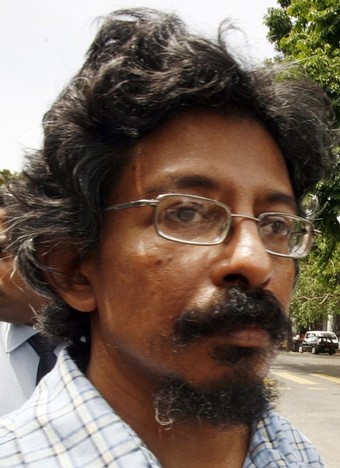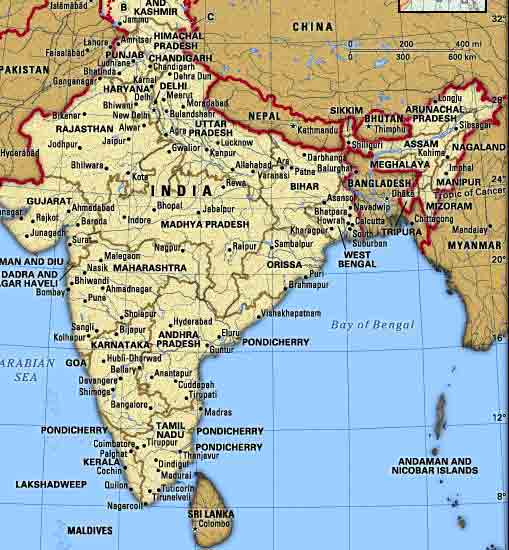|
tamilnet.com
Tissainayagam wins
international award for ‘courageous and ethical journalism’
  J. S. Tissainayagam, a Tamil reporter
sentenced Monday to 20 years in prison, has been named the first winner of the
Peter Mackler Award for Courageous and Ethical Journalism. Tissainayagam was
selected for the awrd, by the US branch of RSF and Global Media Forum (GMF), a
company founded by Mackler to train journalists and non-profit organizations
to use the media as a tool for social change. The Peter Mackler Award, named
for a 30-year veteran of Agence France-Presse (AFP) who died last year,
rewards journalists who fight courageously and ethically to report the news in
countries where freedom of the press is either not guaranteed or not
recognized. J. S. Tissainayagam, a Tamil reporter
sentenced Monday to 20 years in prison, has been named the first winner of the
Peter Mackler Award for Courageous and Ethical Journalism. Tissainayagam was
selected for the awrd, by the US branch of RSF and Global Media Forum (GMF), a
company founded by Mackler to train journalists and non-profit organizations
to use the media as a tool for social change. The Peter Mackler Award, named
for a 30-year veteran of Agence France-Presse (AFP) who died last year,
rewards journalists who fight courageously and ethically to report the news in
countries where freedom of the press is either not guaranteed or not
recognized.
Tissainayagam will be formally awarded the Peter Mackler prize at a ceremony
at the National Press Club in Washington on October 2. Marcus Brauchli,
executive editor of The Washington Post, will be the keynote speaker.
"We are happy to reward J.S. Tissainayagam in 2009, a terrible year for Sri
Lanka," AFP quoted Jean-Francois Julliard, secretary-general of the
Paris-based press rights group Reporters Without Borders (RSF), as saying.
"This country needs journalists who are determined and concerned with finding
the truth," Julliard said in a statement issued hours after Tissainayagam was
jailed for 20 years on charges of supporting terrorism.
"J.S. Tissainayagam is one of those and should never have been imprisoned,"
Julliard said.
"Sri Lanka will never know peace if the press is not free to play its role of
fourth power," Julliard said. "Sri Lankans have the right to be informed about
what is happening on their island.
"They have the right to read words written by men like J. S. Tissainayagam."
Tissainayagam, who has been cited by US President Barack Obama as an
"emblematic example" of a persecuted journalist, was sentenced to 20 years of
hard labor.
He was found guilty on charges of receiving money from the rebel Liberation
Tigers of Tamil Eelam (LTTE) and causing racial hatred through his writings
about Tamils affected by the LTTE war for a separate homeland.
Tissainayagam contributed to Sri Lanka's Sunday Times and ran a website,
Outreachsl.com, that focused on the island's Tamils.
RSF condemned the "extremely severe" sentence imposed on Tissainayagam saying
it "suggests that some Sri Lanka judges confuse justice with revenge.
"With the help of confessions extracted by force and information that was
false or distorted, the court has used an anti-terrorism law that was intended
for terrorists, not for journalists and human rights activists," it said.
The Peter Mackler Award for Courageous and Ethical Journalism was founded in
June 2008 to honor the memory of Mackler, who died of a heart attack that
month at the age of 58.
Mackler covered wars, elections and other notable events around the world
during his career at AFP and was key in transforming the agency's English
language service into the international competitor it is today.
http://www.tamilnet.com/art.html?catid=79&artid=30130
Sentence to Tissainayagam
extra-judicial: HR lawyer [TamilNet, Monday, 31 August 2009]
 The
sentence of 20-year rigorous imprisonment to J.S. Tissanayagam on Monday mark
a sad day for journalists and those who believe in the ’freedom of expression’
all over the world, says Deputy Chairperson of Northeast Secretariat on Human
Rights (NESoHR), K Sivapalan, an Atterney-at-Law from Trincomalee, in whose
opinion this is an extra-judicial way to punish people. ”The provisions of the
PTA are not in conformity with the International Criminal Law especially the
’confession’ being admitted in evidence agaist the accused and with regard to
the burden of proof.UNHRC requested the GoSL to repeal or amend many of the
provisions which were not in conformity. However this was not followed by them
on the basis that it was an erosion of the sovereignty of Sri Lanka,” Mr.
Sivapalan, now exiled in Norway, said. The
sentence of 20-year rigorous imprisonment to J.S. Tissanayagam on Monday mark
a sad day for journalists and those who believe in the ’freedom of expression’
all over the world, says Deputy Chairperson of Northeast Secretariat on Human
Rights (NESoHR), K Sivapalan, an Atterney-at-Law from Trincomalee, in whose
opinion this is an extra-judicial way to punish people. ”The provisions of the
PTA are not in conformity with the International Criminal Law especially the
’confession’ being admitted in evidence agaist the accused and with regard to
the burden of proof.UNHRC requested the GoSL to repeal or amend many of the
provisions which were not in conformity. However this was not followed by them
on the basis that it was an erosion of the sovereignty of Sri Lanka,” Mr.
Sivapalan, now exiled in Norway, said.
Full text of the statement by Lawyer Sivapalan follows: K. SivapalanToday is a
sad day for the journalists and those who believe in the ’freedom of
expression’ all over the world. Journalist J.S.Tissanayagam, Editor of
Northeastern Herald Monthly and the online magazine ’outreach.com , has bee
found guilty under the draconian Prevention of Terrorism Act (PTA) by the
Colombo High Court and sentenced to 20 years rigorous imprisonment.
This has come as a shock hot on the heels of the Video clipping published by
the ’Journalists for Democracy in Sri Lanka’of the extra- judicial killing of
Tamils in Sri Lanka during the war said to be by the Sri Lankan Army
personnel.
Tissanayagam was not arrested on the basis of any ongoing investigation
against him. He was arrested at the Police station when he went to find out as
to why his Printers Jaseetharan and his wife Valarmathy were taken to the
Police Station. It has been held in the case of ,
Pathmanathan-Vs-Officer-In-Charge of TID Vavuniya, by the Sri Lankan Courts,
that it is wrong to arrest a person and then search for evidence to indict
him. This seems to be exactly the case here.
Tissanayagam was indicted in Court after holding him in detention under the
Emergency Regulations (EMR) /PTA for well over six months. It is pertinent to
mention here that in many cases persons are detained without indicting them or
releasing them for long period, upto 18 months using the powers under the
EMR/PTA said to be on suspicion and are freed later when a Fundamental Rights
Application is filed in the Supreme Court under Article 126 of the
Constitution of the Democratic Socialist Republic of Sri Lanka. This is used
as an extra-judicial way to punish people.
Seldom one gets any ’redress’ from the government / Police as the applicants,
who are often the kith and kin of the detained persons are satisfied once the
detainee is released without any further action. Further in 99 percent of
these cases the detainees are tortured in order to obtain a ’confession’ from
them, which is admissible in evidence in cases filed under EMR/PTA.
The Members of the United Nations Human Rights Committee(UNHRC) in the matter
of Nallaratnam Singarasa on a communication by him against the Government of
Sri Lanka (GOSL) expressed the view that many of the provisions of the PTA are
not in conformity with the International Criminal Law especially the
’confession’ being admitted in evidence agaist the accused and with regard to
the burden of proof.UNHRC requested the GOSL to repeal or amend many of the
provisions which were not in conformity.
However this was not followed by them on the basis that it was an erosion of
the sovereignty of Sri Lanka. Later on an application filed on behalf of
Nallaratnam Singarasa, in the Supreme Court, S.C.Spl (L.A) No: 182/99,the then
Chief Justice of Sri Lanka, Sarath N de Silva held that the accession to the
Optional Protocol to the International Covenant on Civil and Political Rights
(ICCPR) which enabled individuals from Sri Lanka to take their cases to the
UNHRC was in itself in excess of the powers conferred on the President of Sri
Lanka under Article 33 (f)of the Constitution. That was the end of the matter.
In the case of Mariyadas, on an appeal, Learned Justice Hector Seneviratne
Yapa held that the standard of proof required of an accused in a Preliminary
Inquiry (Voire Dire Examination) held to decide upon the admissibility of the
so called confession of the accused is lesser than ,’beyond all reasonable
doubt’ expected of a prosecution in a criminal case. Mere doubt created in the
mind of the Judge as to whether ’confession’ was voluntary, was enough in
order not to admit the so called confession in evidence.
It would seem that this has not been followed in this case against
Tissanayagam. Further, it is to be noted that Tissa has been assisting the
Sinhala suspects belonging to JVP when they were being viciously targeted and
killed by the S.L.Army and police. What he has written in the columns of
Northeastern Herald Monthly was not considered to be material fit enough to
bring disharmony between the communities for a very long time but was culled
out now in order to find something to indict him.
In the same vein the poisonous racism spit out by many of the Sinhla
politicians in their speeches would entail all of them to be found guilty if
brought before court for creating disharmony between the communities.
In any event ’rigorous imprisonment’ is something for murderers and hardcore
criminals and certainly not for journalists of the like of Tissainayagam
without previous conviction of any sort.
Leader of an Independent group contesting the Jaffna Municipality Elections
recently said in an Interview that people in Jaffna open their mouths only to
eat.
With this sentence meted out to Tissanayagam only people of the calibre of
Lasantha Wickramatunga may venture to put their pen to paper. In fact those
who brought this prosecution against Tissainayagam might have put to rest
freedom of the press and democracy in the Democratic Socialist Republic of Sri
Lanka.
http://www.tamilnet.com/art.html?catid=13&artid=30131
Lopsided sovereignty
sentences Tissainayagam - journalist [TamilNet, Monday, 31 August
2009]
 If
Tissainayagam is sentenced to 20 years imprisonment for 'inciting communal
feelings' by editing, printing or distributing North Eastern Herald Monthly,
what should be the punishment to Sarath Fonseka, who as commander of the armed
forces publicly said Sri Lanka belongs to the Sinhalese, mutilating the
constitution and inciting genocide in the island, asks a senior journalist in
Colombo. Unfortunately there are governments and diplomats who deceive
humanity by projecting Sri Lanka as a ‘democratically elected government',
besides multi national corporations, who don’t care freedom of people but
grabbing opportunities in the island and there are also media such as The
Hindu in India and a host of others in the international community praising
Colombo on its ‘successes’ in ethnic totalitarianism, the journalist said. If
Tissainayagam is sentenced to 20 years imprisonment for 'inciting communal
feelings' by editing, printing or distributing North Eastern Herald Monthly,
what should be the punishment to Sarath Fonseka, who as commander of the armed
forces publicly said Sri Lanka belongs to the Sinhalese, mutilating the
constitution and inciting genocide in the island, asks a senior journalist in
Colombo. Unfortunately there are governments and diplomats who deceive
humanity by projecting Sri Lanka as a ‘democratically elected government',
besides multi national corporations, who don’t care freedom of people but
grabbing opportunities in the island and there are also media such as The
Hindu in India and a host of others in the international community praising
Colombo on its ‘successes’ in ethnic totalitarianism, the journalist said.
Tissainayagam, Tamil journalist in jail“While on one hand verbally urging
Colombo to curb impunity in human rights, the international community on the
other hand rationalises the impunity of state terrorism and illegitimate
sovereignty of Sri Lanka in the island."
"India and the powers diluting the national question in the island as minority
issue will never address the crisis in the island but will only contribute to
the escalation of state terrorism in all its forms. Tissainayagam case is a
classic example,” the journalist commented.
If unchecked, the dangerous experiment of powers in the island, setting an
ugly precedence in contemporary history, is going to be a serious challenge to
the free world, the journalist further said.
The sentence to Tissainayagam is seen in the Tamil circles as a response of
Colombo to the leak of a video clip allegedly showing extra-judicial killings
of Sri Lanka army. The video clip was released last Tuesday by a group of
Sinhala and Tamil journalists called Journalists for Democracy in Sri Lanka.
http://www.tamilnet.com/art.html?catid=79&artid=30129
CPJ honors Tissainayagam with Press Freedom Award
[TamilNet, Tuesday, 01 September 2009]
  The
Committee to Protect Journalists (CPJ), a New York-based media watchdog,
announced Monday that it will honor imprisoned Tamil journalist J.S.
Tissainayagam with 2009 International Press Freedom Award. "We are announcing
this award today to highlight the depth of outrage at this unjust sentence,"
said CPJ Executive Director Joel Simon. "Its harshness and the retroactive
nature of the charges reflect vindictiveness and intolerance. We are calling
today for Tissainayagam's release--an appeal we plan to repeat at our awards
ceremony, when the world's leading journalists gather to demand press freedom
for all of our colleagues," CPJ's press release said. The
Committee to Protect Journalists (CPJ), a New York-based media watchdog,
announced Monday that it will honor imprisoned Tamil journalist J.S.
Tissainayagam with 2009 International Press Freedom Award. "We are announcing
this award today to highlight the depth of outrage at this unjust sentence,"
said CPJ Executive Director Joel Simon. "Its harshness and the retroactive
nature of the charges reflect vindictiveness and intolerance. We are calling
today for Tissainayagam's release--an appeal we plan to repeat at our awards
ceremony, when the world's leading journalists gather to demand press freedom
for all of our colleagues," CPJ's press release said.
Chrisiane Amanpour, chief international correspondent for CNN will be the
invited Host at the Annual Awards dinner to be held on 24th November.
Full text of the press release follows:
The Committee to Protect Journalists announced today that it will honor
imprisoned Sri Lankan journalist J.S. Tissainayagam with a 2009 International
Press Freedom Award. Tissainayagam, left, sentenced today to 20 years in
prison on specious charges of violating anti-terror laws, is one of five
journalists who will be honored by CPJ at a ceremony in November. The full
slate of awardees, selected by CPJ's Board of Directors this summer, will be
formally announced in September.
A Colombo High Court sentenced Tissainayagam to 20 years of hard labor in the
first conviction of a journalist under the country's harsh anti-terror laws.
Tissainayagam, known as Tissa, suffers from poor health and said his
confession to the charge was extracted under threat of torture, according to
his lawyers.
"We are announcing this award today to highlight the depth of outrage at this
unjust sentence," said CPJ Executive Director Joel Simon. "Its harshness and
the retroactive nature of the charges reflect vindictiveness and intolerance.
We are calling today for Tissainayagam's release--an appeal we plan to repeat
at our awards ceremony, when the world's leading journalists gather to demand
press freedom for all of our colleagues."
Terrorism Investigation Division officials arrested Tissainayagam, an
English-language columnist for the Sri Lankan Sunday Times and editor of the
news website OutreachSL, on March 7, 2008, when he visited their offices to
inquire about the arrest of colleagues the previous day. He was held without
charge under emergency regulations before his indictment in August 2008 for
articles published nearly three years earlier in a now-defunct magazine, North
Eastern Monthly.
Judge Deepali Wijesundara said articles Tissainayagam wrote for the Monthly in
2006 incited communal disharmony, an offense under the Prevention of Terrorism
Act, according to international news reports. She also found him guilty of
raising funds to publish the magazine, itself a violation of the anti-terror
law. The Monthly folded in early 2007.
The anti-terror laws were relaxed in 2006-07, according to CPJ research. Under
a cease-fire accord then in effect between the government and the Liberation
Tigers of Tamil Eelam, the government pledged not to detain people under the
statutes. The government re-enacted provisions of the anti-terror laws after
the cease-fire dissolved in early 2008, according to international news
reports. Tissainayagam will appeal the sentence, the reports said.
The two colleagues, Vettivel Jasikaran and Vadivel Valamathy, also face
anti-terror charges for aiding and abetting Tissainayagam. Published reports
indicate they have not gone to trial. Jasikaran, who also worked on
OutreachSL, owned a printing business that helped publish the Monthly.
Valamathy had no reported involvement with the magazine beside her personal
relationship with her companion, Jasikaran.
"The retroactive sentencing sets a very dangerous precedent. The government
has singled out articles written during the cease-fire, when terrorism laws
weren't even in effect," said Simon. "It sends a very clear message to
journalists who've ever criticized a government policy: Anything you've ever
said could suddenly be evidence against you."
U.S. President Barack Obama highlighted Tissainayagam's case during his World
Press Freedom Day address in May.
Hundreds of prominent journalists will gather in New York on November 24 to
recognize Tissainayagam and the other honorees. Christiane Amanpour, CNN's
chief international correspondent, will be the host; Robert Thomson,
editor-in-chief of Dow Jones and managing editor of The Wall Street Journal,
is chairman of the event.
A CPJ special report, "Failure to Investigate," chronicles some of the growing
incidents of attacks on journalists in Sri Lanka, including circumstances
surrounding the murder of outspoken editor Lasantha Wickramatunga in January
2009.
http://www.tamilnet.com/art.html?catid=13&artid=30138 |

